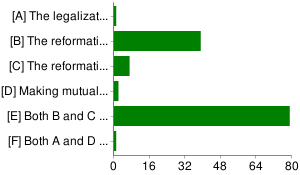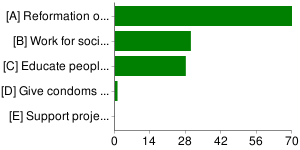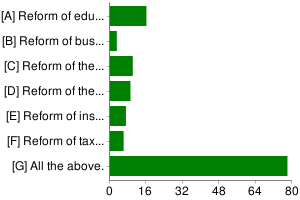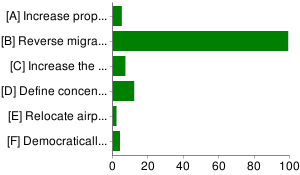ESD V1 Summary Report
129 Responses
Participants' Role in Sustainable Development | |||||||||||||||||||||||||||||||||||||||||
 |
People may select more than one checkbox, so percentages may add up to more than 100%. | ||||||||||||||||||||||||||||||||||||||||
QUESTIONS ON EDUCATION FOR GENDER EQUITY
Section 1
1. What is the importance of gender equity for sustainable development? | ||||||||||||||||||||||||||||||||||||||||

|
| |||||||||||||||||||||||||||||||||||||||
2. In your experience, what is the root cause of gender inequities? | |||||||||||||||||||||
 |
| ||||||||||||||||||||
3. What can you do to help overcome gender inequities? | |||||||||||||||||||||
 |
| ||||||||||||||||||||
4. What institutional (systemic) reformations are required to overcome gender inequities? | |||||||||||||||||||||||||
 |
| ||||||||||||||||||||||||
5. What cultural adaptations are required to overcome gender inequities? | |||||||||||||||||||||||||
 |
| ||||||||||||||||||||||||
QUESTIONS ON EDUCATION FOR HEALTH PROMOTION
Section 2
6. What is the importance of health promotion for sustainable development? | ||||||||||||||||||||||||||||||||||||||||

|
| |||||||||||||||||||||||||||||||||||||||
7. In your experience, what is the root cause of so many people suffering from poor health? | |||||||||||||||||||||||||
 |
| ||||||||||||||||||||||||
8. What can you do to help in the promotion of human health? | |||||||||||||||||||||
 |
| ||||||||||||||||||||
9. What institutional (systemic) reformations are required to improve human health? | |||||||||||||||||||||
 |
| ||||||||||||||||||||
10. What cultural adaptations are required to improve human health? | |||||||||||||||||||||||||||||
 |
| ||||||||||||||||||||||||||||
QUESTIONS ON EDUCATION FOR ENVIRONMENTAL STEWARDSHIP
Section 3
11. What is the importance of environmental stewardship for sustainable development? | ||||||||||||||||||||||||||||||||||||||||

|
| |||||||||||||||||||||||||||||||||||||||
12. In your experience, what is the root cause of environmental deterioration? | |||||||||||||||||||||
 |
| ||||||||||||||||||||
13. What can you do to foster environmental stewardship? | |||||||||||||||||||||
 |
| ||||||||||||||||||||
14. What institutional (systemic) reformations are required to improve environmental management? | |||||||||||||||||||||||||||||
 |
| ||||||||||||||||||||||||||||
15. What cultural adaptations are required for people to live in harmony with the human habitat? | |||||||||||||||||||||
 |
| ||||||||||||||||||||
QUESTIONS ON EDUCATION FOR RURAL DEVELOPMENT
Section 4
16. What is the importance of rural development for overall sustainable development? | ||||||||||||||||||||||||||||||||||||||||

|
| |||||||||||||||||||||||||||||||||||||||
17. In your experience, what is the root cause of rural underdevelopment? | |||||||||||||||||||||||||||||
 |
| ||||||||||||||||||||||||||||
18. What can you do to help promote rural development? | |||||||||||||||||||||||||
 |
| ||||||||||||||||||||||||
19. What institutional (systemic) reformations are required to promote rural development? | |||||||||||||||||||||
 |
| ||||||||||||||||||||
20. What cultural adaptations are required to foster rural development? | |||||||||||||||||||||
 |
| ||||||||||||||||||||
QUESTIONS ON EDUCATION ABOUT CULTURAL DIVERSITY
Section 5
21. What is the importance of cultural diversity for sustainable development? | ||||||||||||||||||||||||||||||||||||||||

|
| |||||||||||||||||||||||||||||||||||||||
22. In your experience, what is the root cause of resistance to cultural diversity? | |||||||||||||||||||||
 |
| ||||||||||||||||||||
23. What can you do to help overcome resistance to cultural diversity? | |||||||||||||||||||||
 |
| ||||||||||||||||||||
24. What institutional (systemic) reformations are required to overcome resistance to cultural diversity? | |||||||||||||||||||||||||
 |
| ||||||||||||||||||||||||
25. What cultural adaptations are required to overcome resistance to cultural diversity? | |||||||||||||||||||||
 |
| ||||||||||||||||||||
QUESTIONS ON EDUCATION FOR PEACE AND SECURITY
Section 6
26. What is the importance of peace and human security for sustainable development? | ||||||||||||||||||||||||||||||||||||||||

|
| |||||||||||||||||||||||||||||||||||||||
27. In your experience, what is the root cause of violence and the resulting human insecurity? | |||||||||||||||||||||
 |
| ||||||||||||||||||||
28. What can you do to help mitigate violence and improve human security? | |||||||||||||||||||||||||||||
 |
| ||||||||||||||||||||||||||||
29. What institutional (systemic) reformations are required to mitigate violence and improve human security? | |||||||||||||||||||||
 |
| ||||||||||||||||||||
30. What cultural adaptations are required to promote nonviolence and human security? | |||||||||||||||||||||||||||||
 |
| ||||||||||||||||||||||||||||
QUESTIONS ON EDUCATION FOR SUSTAINABLE URBANIZATION
Section 7
31. What is the importance of urban growth for sustainable development? | ||||||||||||||||||||||||||||||||||||||||

|
| |||||||||||||||||||||||||||||||||||||||
32. In your experience, what is the root cause of unsustainable urbanization? | |||||||||||||||||||||||||
 |
| ||||||||||||||||||||||||
33. What can you do to enhance the sustainable development of urban areas? | |||||||||||||||||||||
 |
| ||||||||||||||||||||
34. What institutional (systemic) reformations are required to foster sustainable urbanization? | |||||||||||||||||||||||||
 |
| ||||||||||||||||||||||||
35. What cultural adaptations are required to make progress in sustainable urbanization? | |||||||||||||||||||||||||||||||||
 |
| ||||||||||||||||||||||||||||||||
QUESTIONS ON EDUCATION FOR SUSTAINABLE CONSUMPTION
Section 8
36. What is the importance of moderating consumption rates for sustainable development? | ||||||||||||||||||||||||||||||||||||||||

|
| |||||||||||||||||||||||||||||||||||||||
37. In your experience, what is the root cause of unsustainable consumption? | |||||||||||||||||||||
 |
| ||||||||||||||||||||
38. What can you do to help foster sustainable consumption? | |||||||||||||||||||||
 |
| ||||||||||||||||||||
39. What institutional (systemic) reformations are required to promote sustainable consumption? | |||||||||||||||||||||||||||||||||
 |
| ||||||||||||||||||||||||||||||||
40. What cultural adaptations are required for sustainable consumption to prevail over consumerism? | |||||||||||||||||||||
 |
| ||||||||||||||||||||